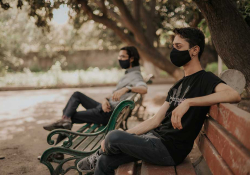Quarantine Notes: or, Moral Aphorisms

During quarantine, a poet, essayist, and aphorist returns to the aphorism, the “sushi of literature.”
If life has placed you on probation, best to proceed with added caution.
Art for art’s sake is a dead end; art for heart’s sake is the way out.
A note to public scolds and angry activists: good intentions are often lost in the spittle.
The difference between success and failure, health and sickness, even life and death—in critical circumstances—is a matter of stamina and sacrifice.
To live heedlessly, while still in harm’s way, is to court disaster.
Nietzsche revised: We have art lest we perish of untruth.
To the humble spirit, criticism is cause for self-contemplation.
Conversation: an encounter between all that we know and what we are about to discover.
As a connoisseur of the abyss, Samuel Beckett offers us a strange solace. First, he confirms our worst suspicions about Life—the absurdity and nothingness that show through everything—then he offers the bitter relief of cackling it all off, saying: “Nothing is funnier than unhappiness.” Becket is us, in extremis.
As a profession, constructing sentences is as honorable as building homes—if we and others can live in them.
What is not a writing prompt?
Writing is a kind of echolocating—to discover our tribe.
One gauge of a person’s intelligence (and interestingness) is their comfort level living with Mystery.
Spiritual immaturity asks: Are we there, yet?
Aphorisms are the sushi of literature.
Bookshelves are cemeteries, where we go to visit our past loves.
Poetry is what happens to prose at boiling point.
Silence is, sometimes, the charitable answer.
Just as some lust for material wealth, there is also spiritual greed for gnosis.
Spiritually speaking, a sense of independence is a form of arrogance.
Even the ritual of turning on our computer every morning, mindfully, can be a form of prayer.
Intervals granted between revelation are for prophets to catch their breath.
Human ideal: poet’s heart, philosopher’s mind, and mystic soul.
The punishment for avoiding suffering is superficiality; the reward for embracing it is spirituality.
Vastness: our only way out of this narrow-hearted mess . . .
Brooding—when birds are ready to sit on their eggs and incubate them, while sacrificing most other activities, including feeding and drinking—is an apt metaphor for the commitment, patience, and care required of creatives, before hatching a new idea.
Chapbook: a full-length book that grew impatient.
Fort Lauderdale, Florida







